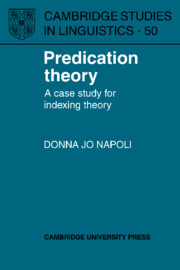Book contents
- Frontmatter
- Contents
- Acknowledgements
- Introduction
- 1 Predicates and theta-role assignment
- 2 The principles of predication coindexing
- 3 Predication coindexing within NP in Italian
- 4 Predication coindexing within NP in English
- 5 A brief look at five more constructions
- 6 An indexing theory encompassing anaphora and predication
- References
- Index of names
- Index of subjects
- Frontmatter
- Contents
- Acknowledgements
- Introduction
- 1 Predicates and theta-role assignment
- 2 The principles of predication coindexing
- 3 Predication coindexing within NP in Italian
- 4 Predication coindexing within NP in English
- 5 A brief look at five more constructions
- 6 An indexing theory encompassing anaphora and predication
- References
- Index of names
- Index of subjects
Summary
Predication, by definition, has been an issue of interest to philosophers and linguists since what we might call the beginning of these disciplines. Only recently, however, have developments in modern linguistics allowed the questions relating to the nature of predication to take on a distinctly non-semantic flavor. For instance, current debates on predication within the Theory of Government and Binding (allowing the GB rubric to envelop many varieties of generative theories that share common properties, such as modularity) often discuss only or primarily the configurational properties of the phrases involved.
The present work, framed in a gently modified version of GB but written with the hope that it will be accessible and useful to linguists of all theoretical bents who have a familiarity with GB, is in part an attempt to pull linguistic discussions of predication back into the arena of semantics, and it has been made possible, perhaps paradoxically, by Noam Chomsky's Barriers (1986a). Chapter 1 outlines a theory of theta assignment and develops an approach to predication based on events and role players in those events. This approach recognizes predicates and role players as primitives that are not configurationally defined. Chapter 2 offers principles of coindexing between a predicate and its subject role player which revolve around theta role assignment. The types of data typically used to support configurational approaches to the coindexing of a predicate and its subject role player are examined, and the empirical inadequacy of these approaches is uncovered. In contrast, the theta-based theory of predication offered here is shown to handle the traditional data well and to make correct predictions about new data.
- Type
- Chapter
- Information
- Predication TheoryA Case Study for Indexing Theory, pp. 1 - 5Publisher: Cambridge University PressPrint publication year: 1989



